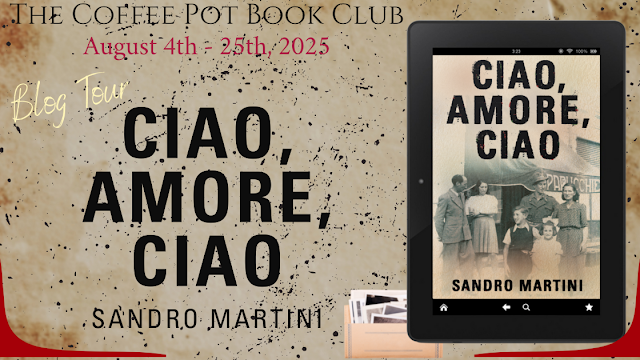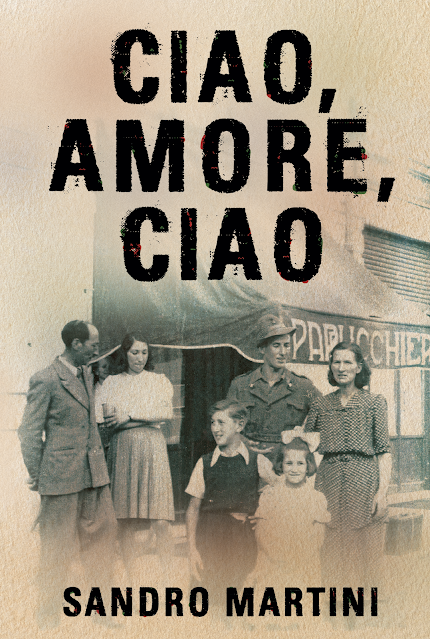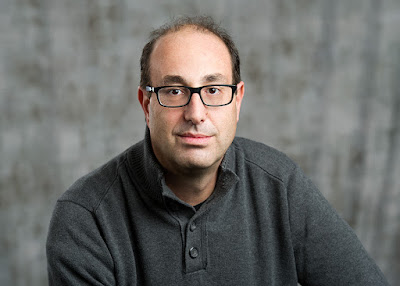Ciao, Amore, Ciao
Alex Lago, Book #1
by Sandro Martini
An enthralling dual-timeline WWII family mystery, based on the heartbreaking true story of the massacre in a small town in Italy in July of 1945, from award-winning, bestselling novelist Sandro Martini.
In the winter of 1942, an Italian army of young men vanishes in the icefields of the Eastern Front. In the summer of 1945, a massacre in Schio, northeastern Italy, where families grieve the dead, makes international headlines.
In present-day Veneto, an ordinary man is about to stumble onto a horrifying secret.
Alex Lago is a jaded journalist whose career is fading as fast as his marriage. When he discovers an aged World War II photo in his dying father’s home, and innocently posts it to a Facebook group, he gets an urgent message: Take it down. NOW.
Alex finds himself digging into a past that needs to stay hidden. What he's about to uncover is a secret that can topple a political dynasty buried under seventy years of rubble. Suddenly entangled in a deadly legacy, he encounters the one person who can offer him redemption, for an unimaginable price.
Told from three alternating points of view, Martini’s World War II tale of intrigue, war, and heartbreak pulls the Iron Curtain back to reveal a country nursing its wounds after horrific defeat, an army of boys forever frozen at the gates of Stalingrad, British spies scheming to reshape Italy’s future, and the stinging unsolved murder of a partisan hero.
Ciao, Amore, Ciao is a gripping story of the most heroic, untold battle of the Second World War, and a brilliantly woven novel that brings the deceits of the past and the reckoning of the present together.
Praise for Ciao, Amore, Ciao:
“A gripping saga that roots excruciating betrayals in a nation’s tragic history.”
~ Kirkus Reviews
~ Kirkus Reviews
“Balances action, suspense, and emotional depth to deliver a truly immersive, thought-provoking read with an unflinching look at the sins of the past and the lengths to which the powerful will go to keep them buried.”
~ Sublime Book Review
~ Sublime Book Review
Ciao, Amore, Ciao runs on three braided timelines. The anchor are two real events—the destruction of the Italian Army in Stalingrad in 1942/43, and the Schio prison massacre in the summer of ’45. Our guide through that latter mess is John Casanova, a 20-year-old U.S. Army investigator sent up from Bologna to find out “who did it”. Of course, the guilty are already decided upon by the brass: Casanova’s job is simply to tie in the missing pieces.
Only one partisan has been arrested when he gets to Schio: Renzo Balbo. Everyone else? Casanova’s job is to smoke them out. The case is true, though the characters—especially Casanova—are invented composites.
If you’re interested in exploring more, the website at CiaoAmoreCiao.com has detailed information.
Casanova: the hard-case cop staring into his own reflection
Casanova reads like noir because that’s how he survives: clipped, cold, efficient. He’s an Italian-American who can’t stand the “Italian” half, so he overperforms the “American” one—orders, procedure, edge. He’ll bark GI hard-boil and then, oops, quote Shakespeare. He slides from “capish” to “langsam” (despite being fluent in Italian), from barracks talk to officer-smooth. That code-switch isn’t swagger, though, it’s self-erasure. He distrusts his soft bits (Italian, bookish, sentimental), so he weaponizes his hard bits (violence, paperwork, control). The more Italian his surroundings, the more he alienates himself.
He calls torture “a massage” and logs it like it’s HR. Not because he’s a cartoon sadist but because control feels like absolution. Snyder, his partner who just wants to go home, ruins that illusion by being competent without cruelty.
And then he meets Renzo Balbo. Balbo isn’t a witness, he’s the only partisan under arrest for the massacre, a suspect Casanova knows will hang for the crime. Their interviews go oddly intimate: predator/confessor, cop/therapist, two men circling the same shame from opposite directions. Casanova needs a clean story for his boss, Colonel Loller (who’s keen to nail the communist partisans). Renzo hands him a messy, all too human one. So Casanova is fractured. Fractured because he’s seen the evil that motivated Balbo’s actions because he’d fought that evil and lost friends in that war. But the Allied brass want a resolution that favours a particular outcome, and Casanova will give it to them.
So he drafts the tidy report that lays the blame on Balbo and the partisans who had, until a month before, been allies in the war against the Nazis. Private Casanova, however, squirrels away Renzo’s truth by keeping the notebook of his confession, slips a protective photo to the local marshal, and even preserves a thread that will later tie Alex Lago (the novel’s other anti-hero) back to a war crime 70 years earlier. He is Balbo’s confessor and executioner and protector.
Older Casanova says war was never “about the killing”. It’s about living with the wrong done for the right reasons. He never fully drops the armour, but he does point his own child at a kinder version of strength. That’s his tragedy and his charge: a cop who polices others to avoid policing himself, who uses a suspect as mirror and shield.
Renzo Balbo: “coward” and the suspect in the chair
Renzo pins coward on his own chest from page one. The reader will learn to disagree. Shame rides shotgun with Renzo too, and he and Casanova understand each other almost immediately. Same shame, different origin. For Balbo, though, it’s class shame, defeat shame, survivor’s shame. On the steppe he learns hunger beats morality. He and his old schoolmate Giulio—magnetic, mocking, stubborn Giulio, scion of a wealthy family—carry a dying comrade for miles through the frozen steppe. That shared burden is the novel’s moral centre: do the human thing until you can’t anymore. Then choose between sacrifice or survival.
Surviving and going home was Balbo’s choice, but that doesn’t heal him. He becomes a partisan, follows Giulio into the mountains, and returns to Schio two years later as an actual liberator (Schio being one of only two towns in Italy that were liberated by Italians). But Renzo has hardened, he’s no longer the shy, forgiving boy who’d gone to war in 1942. “Forgiving the guilty is turning against their victims,” he says, but nevertheless walks into the jail meaning to stop a massacre, not help. What happens? In the crush, he fires one shot—at Buonfuoco, the foreman who had humiliated him on his return from the Russian Front—and bolts while others keep shooting. Not heroism. Not cowardice. Just a man in a moment that is bigger than him.
Which is why he’s in Casanova’s cage. Casanova isn’t just interviewing Renzo; he’s assembling the case that will hang him. And the dynamic gets weird. Renzo is told to write his confession, and it begins with “Dear John”, both a confession and a dare: record this, even if you can’t print it. Casanova threatens him, hurts him, tortures him—then, off the record, safeguards the testimony that muddies his own clean narrative. Suspect and interrogator need each other: one to say it, the other to keep it.
Renzo saves “hero” for other men—the Alpini who charge the underpass at Nikolayevka, Reverberi surfing a tank into machine-gun fire, Giulio trying to “burn the weeds”. His bleak world is that war kills the best and hands the future to the fearful and the sly. He can’t live proudly with “coward”, but he won’t lie about it either.
So who is he? A working-class witness who keeps choosing inside systems built to make choosing meaningless. He wants to be good; the world wants him to be useful instead. He fails plenty. He also tells the truth to the man who will hang him. It’s honest and brave—and, in this novel, honesty is the bravest thing either man will manage.
In them is the force of the novel—that people do what they can, and sometimes what they must, and most will need to deceive themselves to forgive themselves.
This title is available to read on #KindleUnlimited.
Sandro Martini
Sandro Martini has worked as a word monkey on three continents.
He's the author of Tracks: Racing the Sun, an award-winning historical novel. He grew up in Africa to immigrant parents, studied law in Italy, chased literary dreams in London, hustled American dollars in New York City, and is now hiding out in Switzerland, where he moonlights as a Comms guy and tries hard not to speak German.
You can find him either uber-driving his daughter, chasing faster cars on the autobahn, or swimming in Lake Zurich with a cockapoo named Tintin.
His latest historical suspense novel, Ciao, Amore, Ciao, is now available.
Connect with Sandro:
Website • Twitter / X • Facebook • Instagram













No comments:
Post a Comment